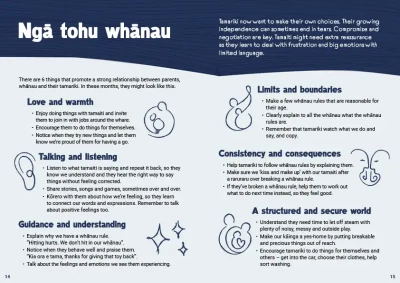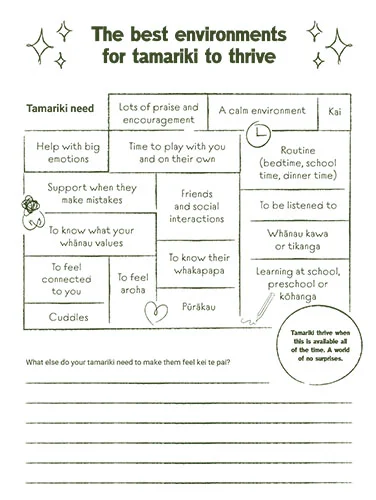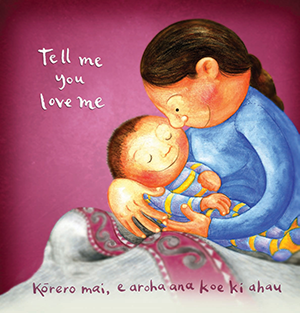
Helping toddlers cope with everyday stress
Looking at situations from a toddler's perspective can help whānau understand why they might sometimes feel stressed. Keeping to routines, clear communication, and appropriate expectations can help whānau in supporting toddlers with stress.
Adults sometimes look back on childhood as an easy time without the responsibilities that they have now. However, from a child's perspective it's not always easy and toddlers feel stress too.
The more we can look at the world from our child's perspective, the easier it is to understand their experience and what they might need from us.
Why might toddlers feel stressed?
Much of everyday life is still new for toddlers – there's a lot to learn. Things we take for granted, like the sound of thunder or the neighbour mowing their lawns might be new and unsettling for toddlers.
They’re experiencing some strong emotions and don’t yet have the language to say how they feel. Tantrums can happen as they struggle with strong feelings and limited ability to handle them.
Toddlers will need to ‘blow off steam’, so it’s important they get plenty of opportunity for vigorous play, preferably outside.
They’re mobile and curious and don’t understand that some things are just not available or suitable for them to touch.
They’re experiencing changes in family life and daily routines. Sometimes adults don’t realise just how upsetting events may be to a young child. These events could include the birth of a sibling, death or sickness in the family, moving to a big bed or starting childcare.
Times of transition, like leaving the house to go to childcare, can be an abrupt change that causes stress. Toddlers may be happy or focused on what they’re doing and not want to stop.
Toddlers are yet to learn about other people’s points of view. At around this age toddlers are really just beginning to understand that other people have feelings that are different from their own.
They want to do things for themselves but their skills are only beginning to develop. At this time they’re learning to assert their independence and communicate their wants.
Children can feel stressed if their needs are not being met and they think they’re not being heard. It's important to show that we understand their feelings even when we can't act on them.
Ideas for avoiding stress
Science tells us that feeling stressed too often or for too long can be harmful to a child’s development. When tamariki have adults support them through stressful times, it helps build their resilience.
Here are some ways parents and whānau can lessen stress:
- Have appropriate expectations of their developmental stage.
- Keep to familiar routines for eating and sleeping.
- Stay firmly and gently consistent with their whānau limits and boundaries.
- Give verbal reminders about impending changes, such as ‘When dad finishes drying the dishes you can have your bath’. Using cues they can ‘see’ rather than words like ‘in 10 minutes’ works best at this age.
- Think ahead so big changes don’t happen too close together – for example, not moving them from a cot to a big bed just before the new baby arrives – giving them time to adjust to changes.
- Help them to learn names for their feelings – ‘It looks like you’re feeling angry because you can’t …’
- Have a balance of quiet time and active time during the day.
- Share picture books about toddlers handling a range of feelings in healthy ways.
- Help them feel they have some control over what happens by giving them choices – for example, ‘Red shorts or green shorts today?’
- Support them with love, warmth and patience as they learn about their emotions and how to handle them.
- Remember that like all the other skills they are learning, it will take time and practice. There will be mistakes along the way.
Parents can also:
- find healthy ways to relieve their own stress
- have their own support network of friends and whānau
- try to look at the world through their child's eyes.
We can’t always prevent stress, but we can support tamariki through it. It's through adults supporting them, over and over again, that toddlers will begin to learn healthy ways to handle their stress. It will take time, and at this age lots of support is needed – they can't do it alone.
Play can be soothing when tamariki are stressed. Ideas include sand, water, playdough, and bubble blowing. This may include snuggling up with a whānau member for a story or a book, or singing and dancing to music. Getting outside can make a big difference. Each tamaiti is different, so it's important to learn what works for them.
We can also look at Ara mātua – parenting pathways for 19–24 months. An environment where parental behaviours reflect ngā ara mātua will not only help children's general wellbeing but will also help them to develop strategies to handle the stresses and strains of everyday life.
Conversation ideas
Helpful resources for whānau
-

Stress and parenting
Whānau Āwhina Plunket
Parenting can impact your mental health in many ways, and increased levels of stress is one of them. This page has ideas for coping with stress, tiredness and anger.
-

Dealing with tantrums
Whānau Āwhina Plunket
Tips on how to avoid tantrums, and what to do when they happen.














